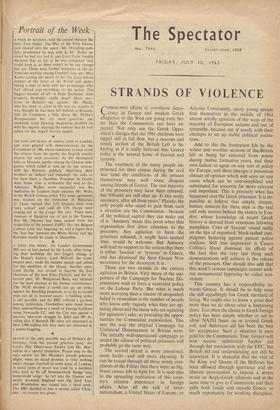STRANDS OF VIOLENCE
COMMUNIST efforts to overthrow demo- cracy in Greece and weaken Greek allegiance to the West are going even bet- ter than the Communists can have ex- pected. Not only are the Greek Oppo- sition's charges that the 1961 elections were rigged still in full flow, but a raucous and rowdy section of the British Left is be- having as if it really believed that Greece today is the natural home of fascism and tyranny.
The treatment of the many people im- prisoned for their crimes during the civil war (and the conditions of the prisons themselves) may well rouse disquiet among friends of Greece. The vast majority of the prisoners may have been released, but 900-odd are still shut up. Is this really necessary, after all these years? Plainly, the only people who stand to gain from such a situation are the Communists—because of the political capital they can make out of it. 'Amnesty' made this point when that organisation first drew attention to the prisoners. Any agitation to have the prisoners released, it might have seemed then, would be welcome. But Amnesty will lend no support to the notion that there is either `fascism' or 'tyranny' in Greece, and has dismissed the Save Greece Now movement for the distortion it is.
There are two strands in the current agitation in Britain. Very many of the sup- porters of the Campaign for Nuclear Dis- armament wish to force a neutralist policy on the Labour Party. But what is much more worrying than a sincere (if misguided) belief in neutralism is the number of people who know only vaguely what they are agi- tating about and the many who are agitating for agitation's sake, so providing the oppor- tunities for Communist exploitation. This was the way the original Campaign for Unilateral Disarmament in Britain went. The initially well-intentioned campaign to secure the release of political prisoners will probably go the same way.
The second strand is more emotional, more facile—and still more alarming. It can be traced through all those windy com- plaints of the Fifties that there were no big, brave causes left to tight for. It is seen also in the spreading realisation of this coun- try's relative impotence in foreign affairs. After all the talk of inter- nationalism, a United States of Europe, an Atlantic Community, many young people find themselves in the middle of 1963 almost wholly ignorant of the ways of the majority of European nations and out of sympathy, because out of touch, with their attempts to set up stable political institu- tions.
Add to this the frustration felt by the wilder and woollier sections of theeBritish left at being far removed from power during twelve formative years, and their own failure to agree on any sort of policy for Europe, and there emerges a poisonous climate of opinion which will seize on any cause which can be over-simplified and substituted for concerns far more relevant and important. This is precisely what has happened over the Greek prisoners. It is im- possible to believe that simple, sincere, human concern for these men is the real and only motive behind the rioters in Lon- don, whose knowledge of recent Greek history is derived from venomous left-wing pamphlets. Cries of 'fascism' sound oddly on the lips of organised, black-sashed cam- paigners battering against patient police cordons. Still less impressive is Canon Collins's bland dismissal (in effect) of the fact that the very last thing such demonstrations will achieve is the release of the prisoners. One should also add that this week's riotous campaigns cannot with- out monumental hypocrisy be called non- violent.
' This country has a respongibility to- wards Greece. It should be to help raise the still appallingly low Greek standard of living. We ought also to know a great deal more than we do about what is happening there. Too often the choice in Greek foreign policy has been simply whether or not to allow NATO bases on or around Greek soil, and American aid has been the bait for acceptance. Such a situation is pure gold for the Communists. True. Greece will now receive substantial further aid through her association with the EEC, but British aid and understanding can still be important. It is shameful that the visit of the King and Queen of the Hellenes has been allowed through ignorance and de- liberate provocation to impose a severe strain on Anglo-Greek relations and at the same time to give to Communists and their gulls both inside and outside Greece so much opportunity for working disruption.


































 Previous page
Previous page